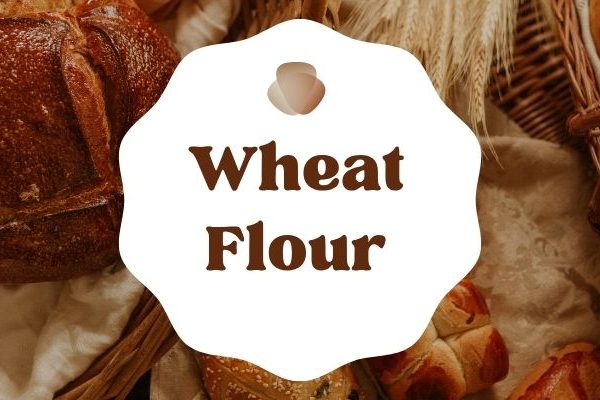- If you have any questions, please contact us!
- +84 965 624 065
- info@greennrj.com.vn

Ultimate Guide to a Smooth and Successful Self-Declaration of Imported Food in Vietnam (2025)
May 27, 2025
How to Successfully Register Functional Foods in Vietnam in 2025: A Complete Guide
May 29, 2025Import Wheat Flour into Vietnam involves complying with Vietnam’s strict import regulations, especially since wheat flour is classified as a food product. Whether you are an established importer or a new business, understanding the wheat flour import procedures is crucial for smooth operations. In this guide, we provide a comprehensive overview of the import procedures Vietnam specifically for wheat flour, covering legal requirements, necessary documentation, and customs clearance steps.
If you’re wondering how to import wheat flour into Vietnam in 2025, this article will walk you through each phase of the process. From obtaining import permits to preparing import documents for wheat flour, our guide ensures you won’t miss a single detail. With the right preparation, your wheat flour import Vietnam journey can be both efficient and fully compliant with current regulations.
Legal Basis for Importing Wheat Flour into Vietnam
To import wheat flour into Vietnam, businesses must comply with a clear set of food safety and customs regulations. As a controlled commodity in the food category, wheat flour is subject to several legal requirements designed to ensure consumer health and product quality. A strong understanding of these legal foundations is critical for navigating the wheat flour import procedures smoothly.
The main legal documents governing the wheat flour import Vietnam process include:
-
Vietnam Food Law (No. 55/2010/QH12) – This overarching law sets the foundation for managing food safety in Vietnam, outlining general principles and responsibilities for food importers.
-
Decree No. 15/2018/ND-CP – Specifies detailed requirements for food safety management of imported food products, including wheat flour. It defines obligations such as self-declaration, documentation, and inspection procedures.
-
Circular No. 38/2018/TT-BNNPTNT – Provides guidance on the inspection process for food hygiene and safety, which is a mandatory step before customs clearance of wheat flour.
-
Additional legal texts issued by the Ministry of Industry and Trade (MOIT) and the Ministry of Health (MOH) outline import procedures Vietnam that apply to foodstuffs in general and wheat flour in particular.
Adhering to these regulations is essential to ensure successful wheat flour customs clearance Vietnam and to avoid legal complications or shipment delays. Importers should also prepare all necessary import documents for wheat flour in advance, as required by current laws.
Classification and Mandatory Self-Declaration (Tự Công Bố)
Before you can import wheat flour into Vietnam, your product must be correctly classified and comply with food safety requirements under Vietnamese law. Wheat flour and related products such as confectionery are officially classified as food products, and are subject to mandatory self-declaration (tự công bố) procedures as outlined in Decree No. 15/2018/ND-CP.
The self-declaration process is a critical part of the wheat flour import procedures, confirming that the product meets all relevant Vietnamese food safety standards. Without completing this step, importers cannot proceed with customs clearance or legal distribution.
Who Can Submit a Self-Declaration for Wheat Flour?
The self-declaration must be submitted by a qualified party with the legal right to distribute or import food products in Vietnam. Eligible applicants include:
-
Importers: Companies or individuals legally authorized to import wheat flour into Vietnam for commercial use.
-
Distributors: Entities that distribute wheat flour or related food products in the local market. They may also act as the self-declaration holder.
-
Manufacturers: In cases where the foreign manufacturer has a representative office or subsidiary in Vietnam, they may apply directly on behalf of their product.
Regardless of the entity type, the applicant must be a registered legal entity in Vietnam with a business scope that includes food production, trading, or importation. This requirement ensures that all parties involved in wheat flour import Vietnam operations are accountable under Vietnamese law.
Completing the self-declaration is the first regulatory checkpoint before preparing other import documents for wheat flour, such as product labels, certificates of analysis, and customs declarations.
Required Documents for Self-Declaration
To meet the conditions set under Decree No. 15/2018/ND-CP, importers and distributors must prepare the following import documents for wheat flour:
1. Self-Declaration Form
-
Must follow Form No. 1, Appendix I of Decree 15/2018/NĐ-CP.
-
This document provides basic product details and a commitment to compliance with food safety regulations in Vietnam.
2. Food Safety Testing Result
-
The test report must be issued within 12 months prior to the date of submission.
-
Testing must be performed by a laboratory that is either:
-
Designated by Vietnamese competent authorities, or
-
Accredited under ISO/IEC 17025 (international lab testing standard).
-
-
Tests must conform to applicable Vietnamese national technical regulations (QCVNs) relevant to wheat flour.
3. Product Information & Label Sample
To properly import wheat flour into Vietnam, your product must include a compliant label and full product profile, which consists of:
-
Complete ingredient list
-
Intended use and usage instructions
-
Shelf life and storage conditions
-
Product label sample, designed according to Vietnam’s food labeling regulations
4. (Optional) Certificate of Free Sale (CFS)
-
Although not mandatory, a Certificate of Free Sale is recommended.
-
Issued by the competent authority in the exporting country, the CFS proves that the wheat flour is legally sold and circulated in the country of origin.
HS Code and Import Duty for Wheat Flour
When you import wheat flour into Vietnam, one of the first steps is identifying the correct HS Code (Harmonized System Code) to determine the applicable import duty and tax rates.
| HS Code | Description | VAT | MFN Duty | Normal Import Duty |
|---|---|---|---|---|
| 1101 | Wheat or meslin flour | |||
| 11010011 | – – Fortified with micronutrients (SEN) | 8% | 15% | 22.5% |
| 11010019 | – – Other | 8% | 15% | 22.5% |
Note: The HS codes and tax rates listed above are for reference only.
Preferential Import Duty Rates under FTAs
Vietnam is part of numerous Free Trade Agreements (FTAs), which may significantly reduce or eliminate import duties for wheat flour. To apply for these rates, a valid Certificate of Origin (C/O) must be submitted.
| Origin Country/Region | Import Duty Rate | FTA / Notes |
|---|---|---|
| China | 15% | MFN Import Duty rate applies – Goods are not eligible for special preferential rates under ACFTA or RCEP at the relevant time |
| India | 0% | AIFTA |
| United States | 15% | No FTA with Vietnam (MFN Import Duty rate applies) |
| ASEAN countries | 0% or 11% | 0% under ATIGA or 11% under RCEP |
| South Korea | 0% or 11% | 0% under AKFTA or VKFTA, or 11% under RCEP |
| Japan | 0% or 11.3% | 0% under AJCEP, VJEPA, or CPTPP; or 11.3% under RCEP |
| United Kingdom | 0% | UKVFTA |
| European Union | 0% | EVFTA |
| Australia | 0% or 11% | 0% under AANZFTA or 11% under RCEP |
| Russia | 0% | VN–EAEUFTA |
| Canada | 0% | CPTPP |
| Mexico | 0% | CPTPP |
Important: To claim these preferential duties, importers must present a correctly completed Certificate of Origin (C/O) with the customs declaration. Inaccurate or missing documents will result in MFN or normal duty rates being applied.
Import Policies for Wheat Flour: Quarantine and Food Safety Inspection in Vietnam
As part of the official wheat flour import procedures, importers in Vietnam must comply with stringent regulatory requirements beyond the self-declaration process. Two key regulatory checkpoints include quarantine registration and food safety inspection, both essential steps in the customs clearance of wheat flour in Vietnam.
1. Quarantine Registration for Wheat Flour
Before initiating import procedures in Vietnam, the importer is required to register the wheat flour shipment for plant quarantine, which is managed by the Plant Protection Department under the Ministry of Agriculture and Rural Development.
The quarantine application must be submitted before the shipment arrives at the port. Without completing this step, customs clearance for wheat flour in Vietnam cannot be carried out.
2. Food Safety Inspection
As wheat flour is classified as a food product, it is also subject to mandatory food hygiene and safety inspection upon entry. According to Vietnam’s food safety laws, importers must coordinate with recognized authorities such as the Vietnam Food Administration (VFA) or authorized food safety inspection agencies.
The importer is required to submit relevant import documents for wheat flour, including the certificate of analysis, packing list, and commercial invoice, as part of this inspection process.
Both quarantine and food safety inspections are critical components in the overall process of how to import wheat flour into Vietnam. These steps are typically conducted at the port of entry and must be completed successfully before customs will release the goods.
Customs Clearance Process for Importing Wheat Flour into Vietnam
The customs clearance process is a vital stage in the overall wheat flour import procedures. Importers must ensure that all necessary documentation is complete and accurate to facilitate the timely release of goods.
When importing wheat flour into Vietnam, the importer must submit the standard set of import documents, which includes:
-
Commercial invoice
-
Bill of lading
-
Packing list
-
Certificate of origin (C/O)
These are the basic documents required for all imports. However, due to the classification of wheat flour as a food product, additional documents are specifically required for wheat flour customs clearance in Vietnam:
Additional Required Documents for Wheat Flour Import:
-
Self-Declaration (Bản Tự Công Bố)
-
Quarantine Registration
-
Phytosanitary Certificate (Giấy chứng nhận kiểm dịch thực vật nhập khẩu)
All of these documents are critical in completing the import wheat flour Vietnam customs procedures. Failing to provide any of the above may result in shipment delays, penalties, or rejection of goods at the port.
Wheat Flour Labelling Requirements When Importing into Vietnam
When importing food products such as wheat flour into Vietnam, complying with local labelling regulations is mandatory. According to Vietnamese law, all imported food products must meet specific labelling requirements to ensure transparency, traceability, and consumer protection.
General Label Requirements for Imported Food Products
Under current Vietnamese regulations, labels on imported wheat flour must clearly and accurately present the following information:
-
Product name
-
Name and address of the importer or responsible entity in Vietnam
-
Country of origin
-
Additional information related to the product type or specifications
These are the minimum requirements applicable to all imported goods.
Mandatory Labelling Requirements for Food Products (Decree 111/2021/ND-CP)
For food products like wheat flour, the Vietnamese government enforces additional mandatory labelling content as stipulated in Decree No. 111/2021/ND-CP. These include:
-
Net weight or volume
-
Manufacturing date
-
Intended use or usage instructions
-
Ingredient list and nutritional information:
-
List of ingredients
-
Nutritional composition (if applicable)
-
Energy and nutrient values, presented as per Ministry of Health guidelines
-
-
Storage instructions (e.g., Keep in a cool, dry place)
-
Usage and preservation guidelines
Conclusion
Importing wheat flour into Vietnam requires strict adherence to local regulations to ensure food safety and smooth customs clearance. Importers must complete the self-declaration process, prepare all necessary documents, comply with labeling and inspection standards, and understand applicable import duties. Staying compliant not only helps avoid delays but also strengthens consumer confidence in your products in the Vietnamese market.
At Green NRJ, we specialize in supporting businesses with every step of the wheat flour importation process into Vietnam. From regulatory compliance to document preparation, our experts are here to help. Contact us today to ensure a hassle-free and efficient import experience.




